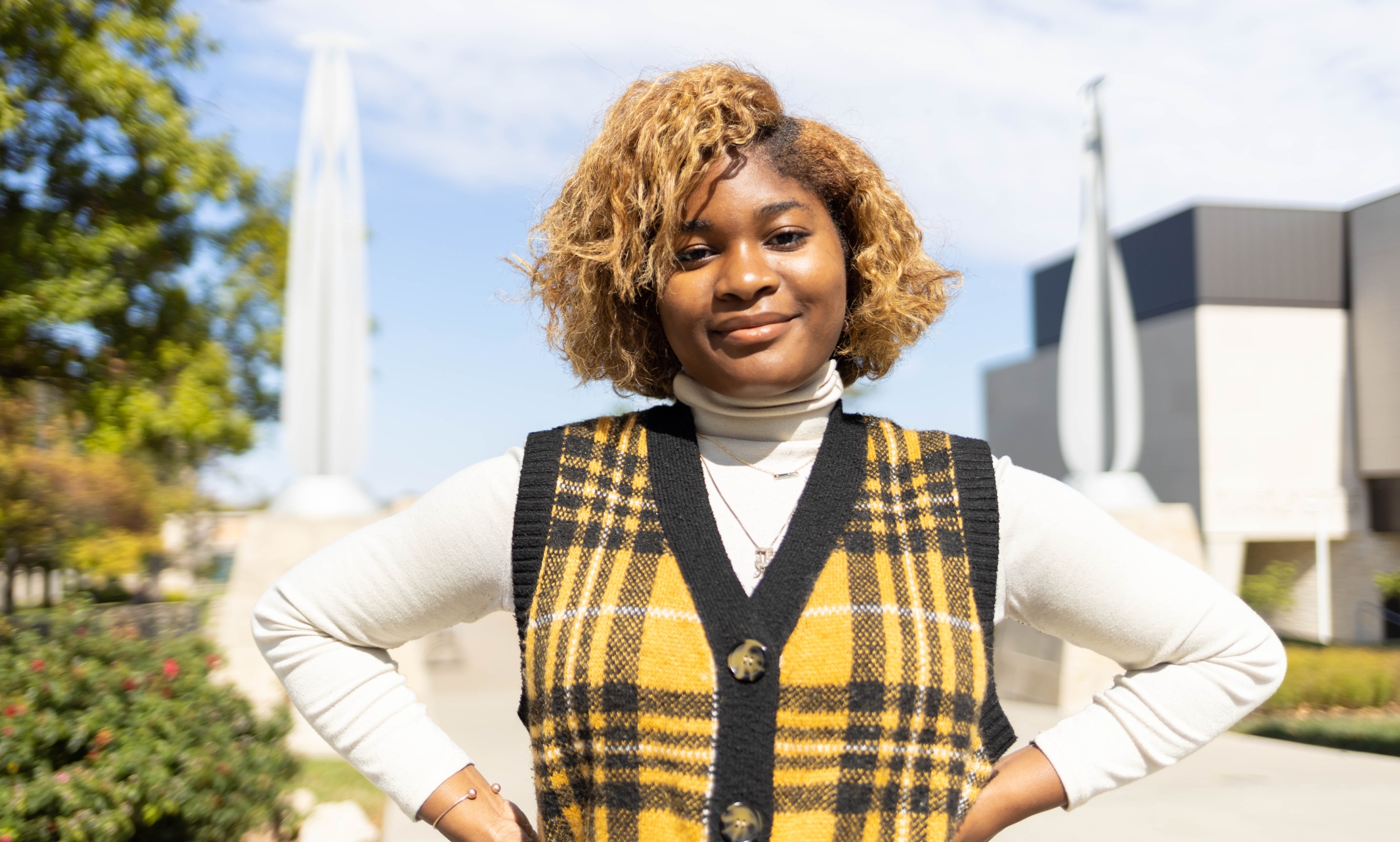
Participating students could save thousands on a college degree
The University of Missouri-Kansas City has launched new partnerships with Kansas City Public Schools and North Kansas City Public Schools that will save families thousands of dollars on a college degree. UMKC will provide automatic, renewable scholarships for any student who enrolls from those two districts. Furthermore, students from both districts can earn college credit on the UMKC campus before high school graduation for added savings.
The initiative is a huge win for the Kansas City community – and for students and their families.
“As Kansas City’s university, we’re committed to increasing college access to students here at home,” said Kristi Holsinger, senior vice provost for student success at UMKC. “Through this partnership, students will save money, earn their degree sooner after high school graduation and go on to serve our community through rewarding careers.”
UMKC has introduced a new, automatic $1,500 scholarship for up to five years for any student from the KCPS or NKC school districts. The scholarship is stackable – meaning it can also be combined with any other award.
And UMKC’s Early College Academy allows eligible high school students to attend classes on campus during the school day. It is open to qualifying juniors and seniors at KCPS and qualifying seniors at NKC. Students earn both high school and college credits from their UMKC courses. Tuition, at a reduced rate, is covered by KCPS and NKC.
“The Early College Academy model makes so much sense for our scholars,” Jennifer Collier, Ed.D., KCPS interim superintendent, said. “We know partnering with UMKC will open doors for KCPS students.”
Jayla Williams is one of the first KCPS students to participate in the program. Williams, who is in her first semester, said within the first few weeks she has already had a chance to connect with her professors and meet friends in her classes.
“It’s been an easy adjustment because my school prepared me,” said Williams. “I’m doing something that many people don’t get to do. I’m doing something that is bettering my future.”
Her mom, Janese Williams, said she is proud of Jayla and what her participation will provide.
“It means opportunity. It means elevation. She’s only 16 and she’s a college student,” said Williams. “I love that this is an opportunity that kids in Kansas City get to do. To give them a step ahead is priceless.”
Jayla and Janese Williams
North Kansas City Schools College and Career Readiness Assistant Director Shannon Gilliland said the new partnership will increase students’ course options and help them acclimate to college life.
“This will be an opportunity to learn how to navigate a large academic environment, while still having guidance as a high school student,” said Gilliland. “UMKC has about 16,000 students and getting comfortable in this environment can help our students gain confidence.”
UMKC offers more than 125 undergraduate programs, with small class sizes and real-world experiences to help students gain practical knowledge to prepare them for careers. In addition, its location in Kansas City provides strong relationships with some of the region’s top employers for internship and job opportunities.
“We are excited to see our students take advantage of the exceptional educational experience UMKC provides,” said North Kansas City Schools superintendent, Dan Clemens, Ed.D.
Students in the Early College Academy will have access to support services such as Academic Advising, Academic Support and Mentoring, Career Services and the Financial Wellness Center.
Early college programs have been shown to have a positive impact on student performance both in high school and in college, according to a 2020 policy report from the American Institutes for Research.
Additionally, the report indicates early college programs have lasting impact on communities by increasing college degree attainment, individual earning potential and tax revenue. In fact, UMKC alumni contributed $7.8 billion to Missouri’s economy in 2021, according to the university’s February 2022 Economic Impact Report.
Oct 11, 2022
Program looks to increase underrepresented students getting STEM degrees
A UMKC program aimed at providing early-college STEM experiences to underrepresented high school students celebrates a decade of accomplishments this year.
Aptly titled A Bridge to the Stars, the program allows the selected students to participate in one of Professor Daniel McIntosh’s 100-level astronomy courses, with the help of UMKC faculty and student near-peer mentors. These Bridge Scholars receive scholarships that cover tuition and fees and the course workbook. They also receive all resources available to UMKC students for the semester.
Daniel H. McIntosh, Ph.D., distinguished professor of physics and astronomy and founder of A Bridge to the Stars, is proud of what the program has accomplished over the years.
“In the decade that we have run this program, we've awarded 81 scholarships to 73 different high school kids,” McIntosh said. “Ninety-five percent of those students completed the class for college credit. There is no gap in their learning outcomes compared to roughly 1,000 UMKC students enrolled in the same classes.”
McIntosh notes that 80% of participants have been students of color, and nearly all come from low-income households. “What’s even more amazing about these outcomes is that the Bridge Scholars have been selected based solely on their stated aspirations to go to college and on their interest in astronomy. This program is truly equitable in that our selection is not based on academic performance.”
In an effort to grow the program into the next decade, McIntosh has brought on Lauren Higgins (MS ’22) as Program Coordinator. Higgins was a peer mentor for A Bridge to the Stars and said the opportunity was formative to her college career.
“It’s more than just helping the students, which is also great,” Higgins said. “Undergraduates from across many different departments are given an opportunity to help students get a higher education experience. These Roos get experience collaborating with a team and giving a presentation. They get to go to a conference and network. For UMKC students, too, it's great program.”
With Higgins’ help, McIntosh hopes he can spread the concept of A Bridge to the Stars to other departments and other universities.
“My motivation from the very beginning was recruiting more underserved kids into STEM degree programs and ultimately careers to broaden stem,” he said. “I always summarize when I give high level talks that there are huge national, regional and local challenges to increasing and broadening the future STEM workforce. I believe that intentional programs like A Bridge to the Stars can provide a way to inspire and empower many students who are historically less likely to self-identify with STEM careers yet can succeed in STEM if encouraged.”
Sep 28, 2022
Funds support redesign and development of new academic assessment resources
The Kansas City Regional Professional Development Center (RPDC) at the University of Missouri-Kansas City received a contract for up to two years and $29 million from the Missouri Department of Elementary and Secondary Education to re-design academic assessment resources to help teachers identify and address gaps in student learning in a more timely and effective manner.
The Kansas City RPDC, housed in the UMKC School of Education, Social Work and Psychological Sciences, will provide staffing, design, content development and project implementation to support research in learning loss from Kindergarten through high school. The project was born from a need to understand how the effects of the COVID-19 pandemic disrupted elementary and secondary education in Missouri, but also has a larger purpose of developing a tool that will provide teachers data on student comprehension within the year they are teaching, so the gaps in learning can be addressed before the summer break.
“Based on scientific knowledge this is a huge step,” Michael Pragman, Ed.D. senior program director at the RPDC, says. “Typically, in the state of Missouri there are assessments that are officially measured starting with third grade. At that point you may be receiving data on a student entering fourth grade who is already behind.”
Providing teachers with data on whether they are meeting the goals for the students within the academic year will be a difference-maker, because teachers will receive information for their current students and have time to address them before the students move on to a new grade and teacher.
Pragman anticipates that addressing learning challenges earlier may have long term academic effects.
“If we wait until the end of third grade, a lot of students who are frustrated don’t care about school anymore. We know from research that by fourth grade students either have a love of learning and want to continue or are bored, and their behavior is to act out. We think the results of this testing may abate some of that.”
Carolyn Barber, Ph.D., interim dean of the School of Education, Social Work and Psychological Sciences, says the focus on individual learning is an important part of this research.
“I think it's a testament to the work that the RPDC and the school has done to be a partner, not only in the Kansas City Metro, but to the state of Missouri. We are recognized for our expertise,” Barber says. “We didn’t start working with assessments like these because there was a crisis. Dr. Pragman and members of his team have been active in this area for years, which is what made us an attractive partner for the state of Missouri.”
Sep 27, 2022
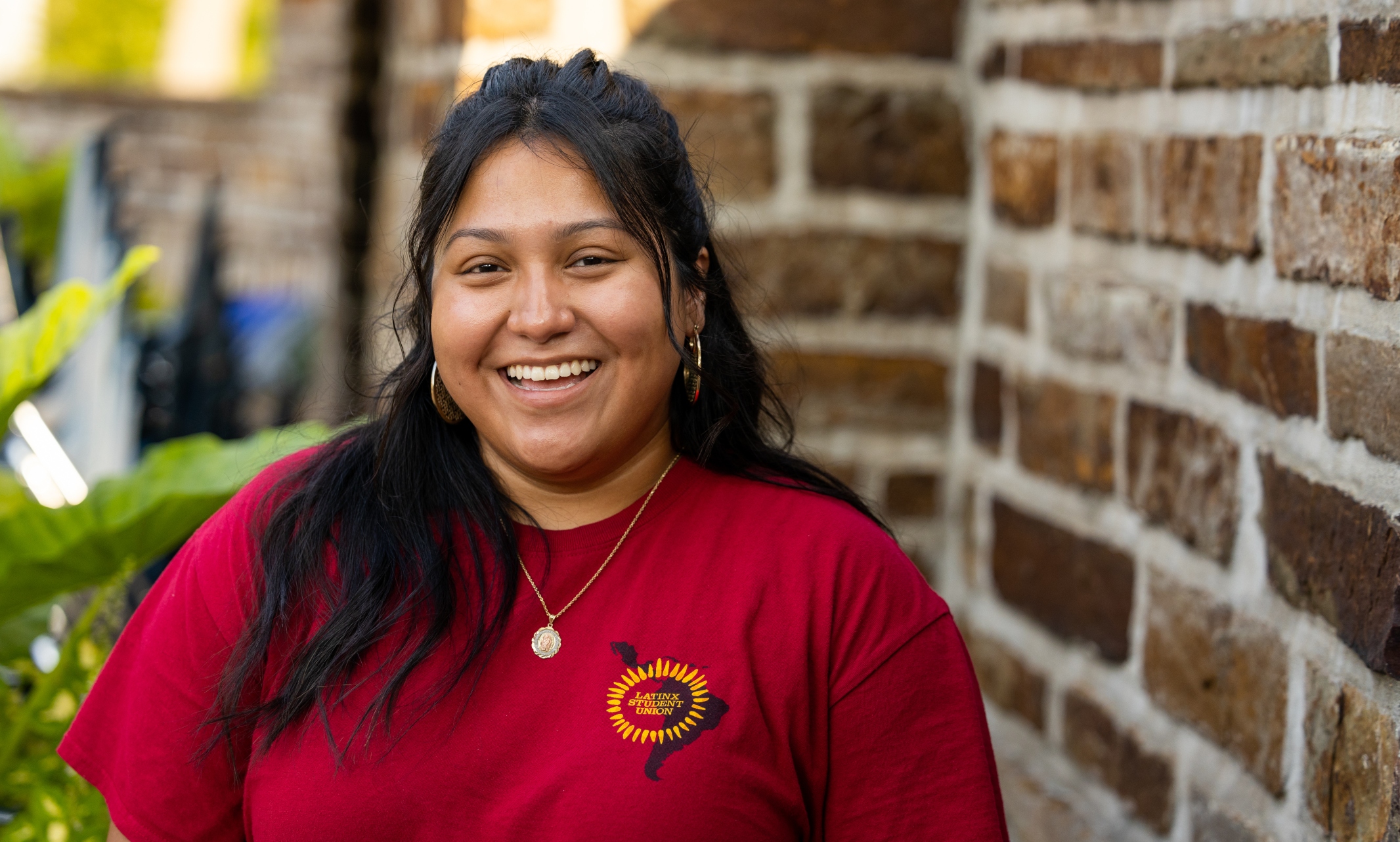
Lauren Orozco decided to attend UMKC for the vibrant community
Roos don’t just dream, they do. Our students turn ideas into action every day. Get to know our people, and you’ll know what UMKC is all about.
Lauren Orozco Anticipated graduation: 2022Academic program: B.A. business, marketing; minor Latin American StudiesHometown: Kansas City, Kansas
Why did you choose UMKC?
I was thinking about going further away, but I decided to stay close to home. UMKC allowed me to have a secure place in the community that’s so vibrant. That was a big draw.
Why did you decide to major in marketing?
I would like to create and provide resources for my Latinx community. I think the greatest way to do that is making sure that people are informed. Marketing is all about information and creating resources for people. So, combining that with my Latin American Studies minor, I am able to do both.
What are the challenges of the program?
I have such a nonprofit focus with my marketing degree. Differentiating the needs of the corporate and nonprofit sectors is definitely hard, especially in marketing, just because it can be so corporate.
What are the benefits of the program?
Being a student at the Henry W. Bloch School of Management puts you on a higher pedestal in Kansas City in general. As Bloch students we have so many resources. I've had the opportunity to meet great people, not only through my professors, but through the events that Bloch offers.
UMKC is impacting the community in such different and diverse ways. When I say I am a UMKC student, it typically puts a glow on everyone’s faces.
How has the program inspired you?
I think being a Latina in the business sector is hard. So, I found people that identify this way, and as other minorities, within the business program and through the Multicultural Student Affairs office during my first semester at UMKC. That really gave me a base to work with through the rest of my college career.
My three passions really came to light at UMKC: my focus on my community, marketing and higher education. I've been able to combine all three. and I don't think I would have been able to have this clear path for myself had I gone to any other school.
Also, I work extensively with the Academic Support and Mentoring (ASM) office. It's a great resource for students, and I’ve realized how many opportunities and resources I can provide for my higher education community through my experience with ASM.
Now that I'm finishing up, I realize how many resources and opportunities I opened up for myself by just relying on a community that I found here.
You’re president of the Latinx Student Union. How did you get involved?
The Latinx Student Union is how I got involved with UMKC in the first place. I was at the Fiesta Hispana in Barney Allis Plaza, and I met someone who said she was involved with LSU at UMKC and that they were fundraising for new student scholarships. I thought it was great that this was something I could get involved in at UMKC. Throughout Hispanic Heritage Month we work with community partners to raise awareness about this home away from home at UMKC.
What would you tell someone who doesn't have the experience that you had in getting exposed to the Hispanic student union so organically, especially if they were a little intimidated?
I think it's definitely scary to just be put into such a large atmosphere and expect to make friends and be a part of this community. But when I first meet students, I always say, “We're not just acquaintances, we're friends. Follow me on social media, we'll DM each other, and you ask me any question that you want to.” I make myself an open resource for them.
Do you feel as if you are a resource for other people?
Yes, I work with both the higher ed and the Latin X communities here on campus, and I’m able to become a resource for all parts of campus. I opened myself up to the students as well, which provides peer-to-peer contact versus just faculty or supervisor. I feel like it makes people feel a lot more comfortable coming to me, a student, and asking questions.
Who do you admire most at UMKC?
Jessica Brooks (director of ASM) and Megan Elsen (associate director of ASM) have really shined a light on what it's like to be a diverse first gen student at UMKC, and they've given me a pathway to feel seen and heard on campus. I felt at first like I was at an automatic disadvantage but having resources like ASM and its faculty and staff, I felt that I had a dictionary to this really diverse vocabulary that is the university lifestyle.
What do you have to take from your experiences here into your professional career?
I want to work in higher ed, and I think UMKC gave me a great baseline of what it means to be a part of a huge family in a big city. UMKC is Kansas City's university. And I don't think I'll ever get that experience anywhere else.
Sep 26, 2022
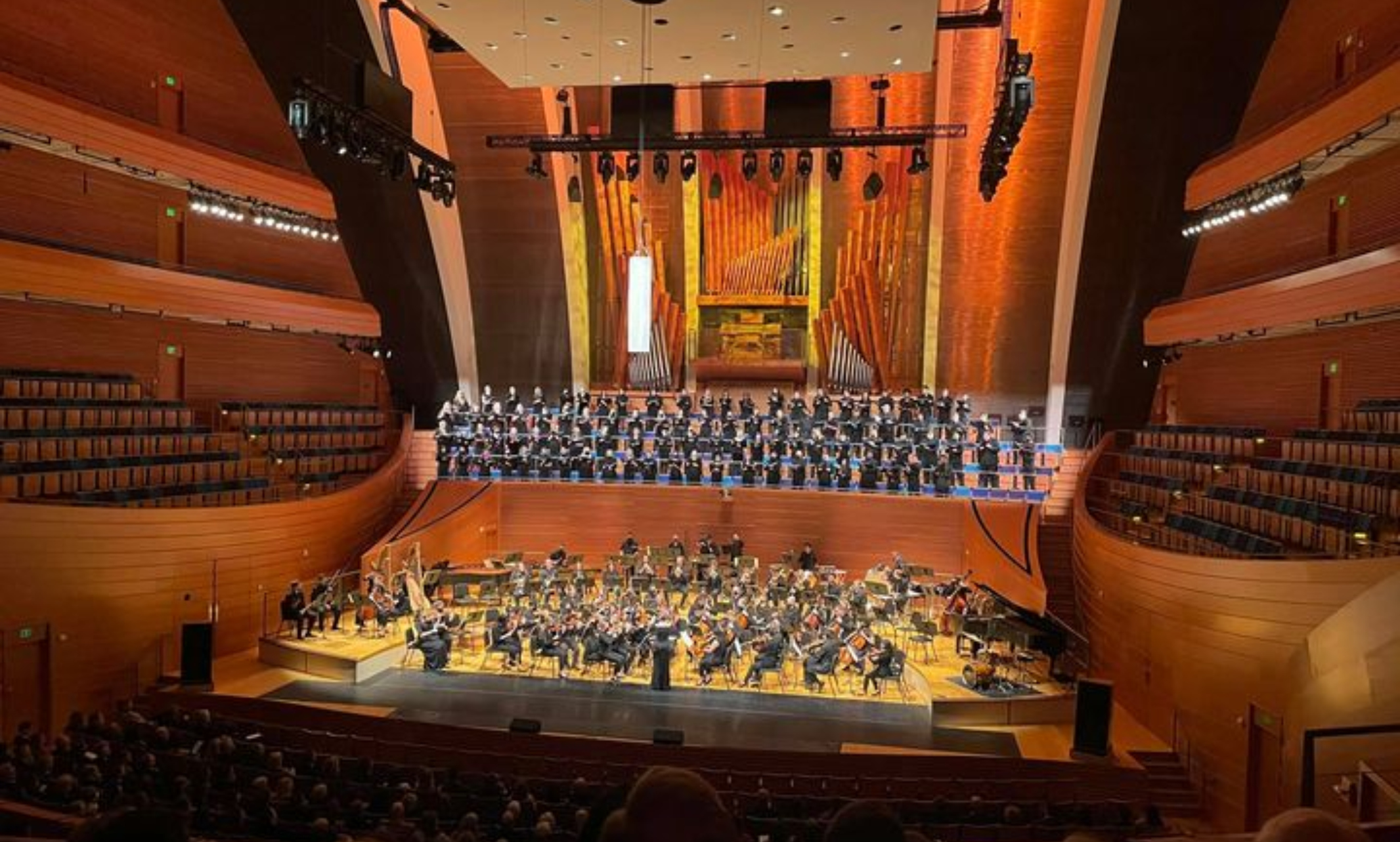
From soccer to the symphony to service projects, there’s something for everyone
Once again, it’s time to celebrate UMKC Engagement Month, a 31-day celebration of all the ways our UMKC students, faculty, staff, alumni and friends contribute to the Kansas City community and beyond.
UMKC and the University of Missouri System are dedicated to providing teaching, research and service to our community and state year-round; during October, we celebrate that commitment with an array of special events. This year, from soccer to the symphony to service projects, there are numerous opportunities to join in the celebration of our commitment to transform our community and region with impactful engagement.
UMKC Engagement Month activities are produced by the Division of External Relations and Constituent Engagement. Click here for UM System Extension and Engagement Week information.
The full schedule of UMKC events is available at this page. Here’s a look at some of the highlights.
UMKC Day at the Kansas City Symphony
Sunday, Oct. 9 | 2 p.m.| Kauffman Performing Arts Center, 1601 Broadway
The Kansas City Symphony is generously providing the UMKC Community with discounted tickets at a rate of $12 per ticket (parking at additional cost). Visitorg or call (816) 471-0400 and ask for the UMKC discount for this performance.
The performance will feature multiple pieces revolving around the theme of nature and the environment, including a performance by Principal Percussionist Josh Jones of Adam Schoenberg's percussion concerto, "Losing Earth."
More information at https://community.umkc.edu/engagements/umkc-day-at-the-kansas-city-symphony/
“ART of Being Me” mental health exhibit
19 through Nov. 30 | Throughout Miller Nichols Library
UMKC is partnering with the Burrell Foundation to display the exhibit created by artist Randy Bacon. It consists of multiple forms of media, including inspiring portrait artwork, personal written stories and a series of short films.
The collection showcases the personal stories of more than 20 individuals who have lived experiences with mental health conditions or diagnoses.
A UMKC student will be adding a new piece to the exhibit that will be on display here and then continue on with the exhibition.
More information at https://community.umkc.edu/engagements/umkc-to-host-the-burrell-foundations-art-of-being-me-mental-health-exhibit/
UMKC Night at Sporting KC
Sunday, Oct. 2 | 4 p.m.| Children's Mercy Park
Sporting Kansas City takes on conference rivals Seattle Sounders
Before the game, stop by the Mazuma Plaza to visit with representatives from Athletics, Admissions and Alumni Relations. There will be giveaways, photo opportunities with KC Roo and more.
More information at https://www.umkcalumni.com/s/1236/16/index.aspx?sid=1236&gid=1&pgid=4559&content_id=6032
Troostapalooza
Saturday, Oct. 8 | noon-6 p.m. | 30th and Troost
Celebrates the local community by bringing together neighbors, small businesses and entrepreneurs to engage with their community and highlight the Troost Corridor.
UMKC is the lead sponsor of the event.
More information at https://community.umkc.edu/engagements/troostapalooza/
UniverCities Exchange
Topic: Combating Missouri’s Urban Food Deserts
Monday, Oct. 10 | 2-3 p.m.
UniverCities Exchange, an ongoing collaborative project between UMKC and UMSL, gathers community leadership alongside academic expertise to discuss problems and possible solutions to issues affecting the Kansas City and St. Louis Metro Areas.
Panelists Include:
Dina Newman, Director of the UMKC Center for Neighborhoods
Aimee Dunlap, UMSL Associate Professor of Biology
Erica Williams, Executive Director, A Red Circle
Max Kaniger, CEO, Kanbe's Markets
Moderated by Steve Kraske of KCUR
More information at https://community.umkc.edu/engagements/univercities-exchange-combating-missouris-urban-food-deserts/
Hungry for Trivia: A Hungry for MO Season 2 Launch Party
Oct. 19 | 6:30 p.m.| Casual Animal Brewery, 1725 McGee St.
UMKC, KCUR, and the Missouri Humanities Council sponsor a food-based trivia contest to support KCUR and UMKC’s Kangaroo Pantry at the Dr. Raj Bala Agrawal CARE Center.
The event is a launch party for Season Two of "Hungry for MO," a podcast that brings you the stories behind iconic foods in the state of Missouri.
More information at https://community.umkc.edu/engagements/hungry-for-trivia-a-hungry-for-mo-season-2-launch-party/
Sep 22, 2022
Alumna Amanda Davis begins her role as president Nov. 2
Amanda Davis (MPA ’02) has been named the new University of Missouri-Kansas City chief advancement officer and president of the UMKC Foundation beginning Nov. 2. Davis has extensive experience in university fundraising, including the creation of advancement infrastructure and the development and execution of a comprehensive $2 billion campaign.
Davis began her fundraising career in Kansas City in 2002, generating more than $600,000 annually for Genesis School. She has extensive knowledge of UMKC and the UMKC Foundation through her work as director of advancement for the UMKC Law Foundation from 2009-2011.
Continuing to build her career in university advancement, her most recent role was assistant vice president for campaign leadership at the University of Oklahoma Foundation, where she developed programs and policy to accelerate advancement outcomes. Her focus on identifying gift opportunities and prospects contributed to more than $300 million in annual fundraising results.
Davis brings a deep understanding of the Kansas City and UMKC communities. She will have dual reporting responsibilities to UMKC Chancellor Mauli Agrawal and the UMKC Foundation Board of Directors. She will also serve on the university Executive Council and have broad authority to shape and build an advancement program supporting UMKC and UMKC Athletics through annual giving, corporate and foundation relations, major gifts and gift planning programs, endowment, capital campaigns, stewardship and advancement services.
“Amanda has significant experience and success at large universities that will be key to taking our UMKC Foundation to the next level,” Chancellor Agrawal says. “She has a passion for cultivating new donors and bringing advancements in technology to improve the way we do business. In addition, we are thrilled that she knows and understands our Kansas City community and we will be excited to incorporate her ideas here at UMKC.”
She is ready to leverage the existing strengths of the UMKC Foundation for long-term university and community growth and success.
“With the successful staff that is already in place, and the support of the UMKC Foundation board members who are passionate about the community as a whole and the accomplishments of individual students, I know we can execute the vision for accelerating student success, generating significant growth in research and the commitment to further healthcare delivery for the region,” Davis says.
Jerry Reece, chair of the UMKC Foundation Board, says he has high expectations for Davis.
“We are confident that under Amanda’s leadership the UMKC Foundation will continue to be a trusted community partner and exceed its goals for the development of the university,” he says. “We look forward to her engagement with the university and Kansas City communities.”
Co-chairs for the search were Warren Erdman, executive vice president Kansas City Southern Railway and UMKC Trustee and Sheri Gormley, chief of staff, office of the chancellor at UMKC.
Davis is excited to be back in Kansas City and ready to reestablish her community ties.
“One of my favorite quotes is from Horace. ‘Begin, be bold, but venture to be wise.’ This corresponds with my view of UMKC. There’s a vision and an opportunity to be exceptional,” she says.
Sep 21, 2022
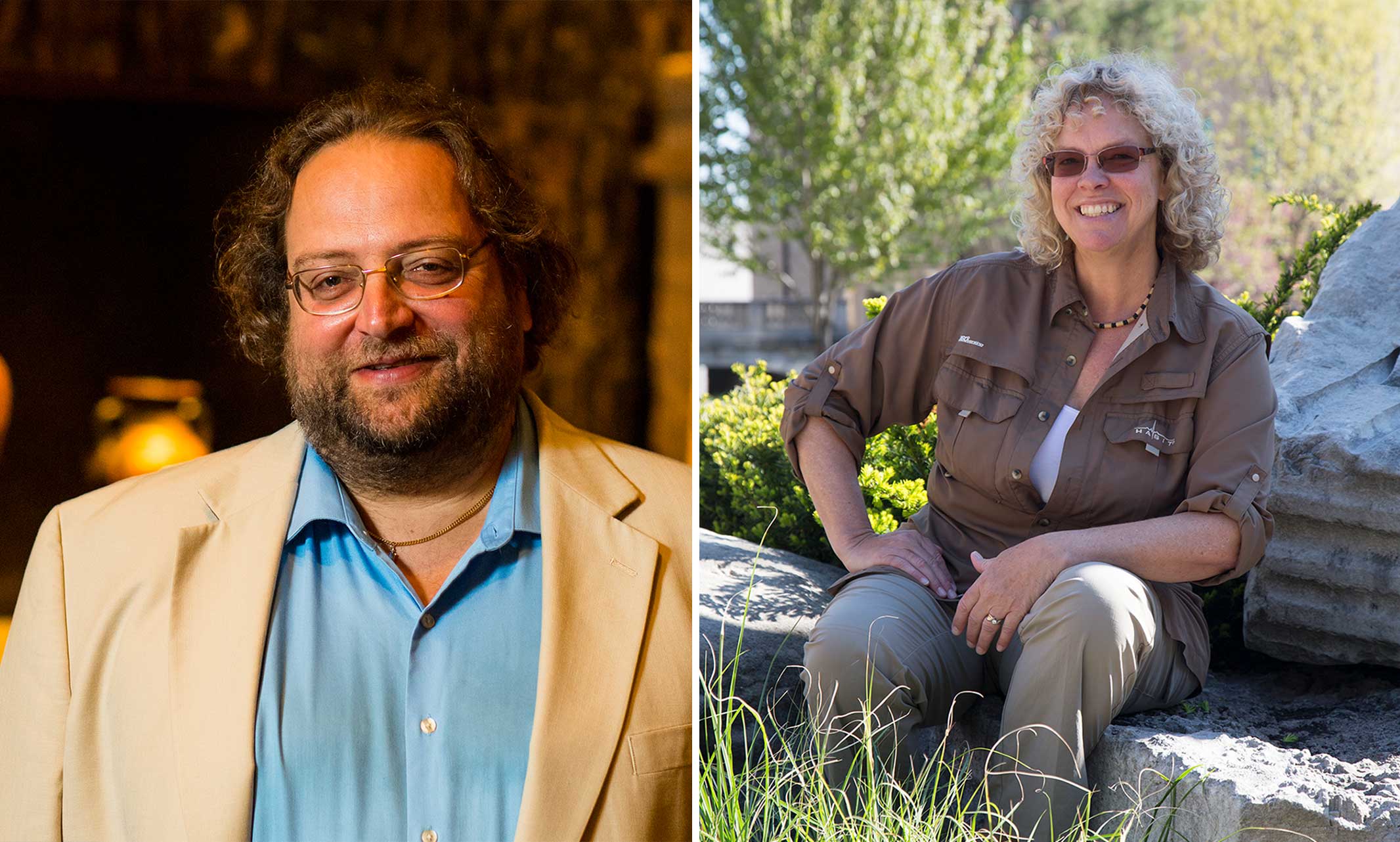
The award is the highest and most prestigious academic rank in UM System
The University of Missouri Board of Curators recently named two University of Missouri-Kansas City faculty members Curators' Distinguished Professors.
A Curators' Distinguished Professorship is the highest and most prestigious academic rank awarded by the Board of Curators. It is given to a select few outstanding scholars with established reputations.
This year, Tina Niemi, Ph.D., of the School of Science and Engineering, and Massimiliano Vitiello, Ph.D., of the School of Humanities and Social Sciences, were selected for the honor.
"Tina and Massimiliano are exemplary role models for what it means to be a UMKC faculty member. They both have accomplished so much and we could not be more proud," said Jenny Lundgren, Ph.D., Provost and Executive Vice Chancellor.
Niemi is a geologist who specializes in geoarchaeology, sedimentology and active tectonics. She and her students collect aerial imagery using drones and stratigraphic data from outcrops, trench excavations and cores in order to build a deeper understanding of the history and nature of tectonic, climate and anthropogenic environmental changes through time.
"I am honored to have been awarded a Curators' Distinguished Professorship and I thank my colleagues, collaborators and students both for supporting my nomination, and even more, for so many wonderful years of working together," Niemi said.
Vitiello is a scholar of ancient history, Late Antiquity, Byzantium and the early Middle Ages, with an emphasis in Roman History. He specializes in the history of the late Roman Empire and the transformation of the Mediterranean World, and works on classical philology, historiography, epigraphy, numismatics and the material culture of the classical world.
"I am deeply honored by this appointment and I am determined to continue my research with dedication and passion," Vitiello said. "The University's commitment to scholarship that this distinction represents is both humbling and inspiring."
In addition to Niemi and Vitiello, this year's recipients also include:
Curators' Distinguished Professor Emeritus, John C. Walker, MU
Curators' Distinguished Teaching Professor, Dorina Kosztin, MU
Curators' Distinguished Teaching Professor, David Westenberg, S&T
Curators' Distinguished Professor, Sajal Das, S&T
Curators' Distinguished Professor, Rajiv Mohan, MU
Curators' Distinguished Professor, Ron Mittler, MU
Curators' Distinguished Professor, Kannappan Palaniappan, MU
Curators' Distinguished Professor, Robert Paul, UMSL
Curators' Distinguished Professor, Thomas Sewell, MU
Sep 20, 2022
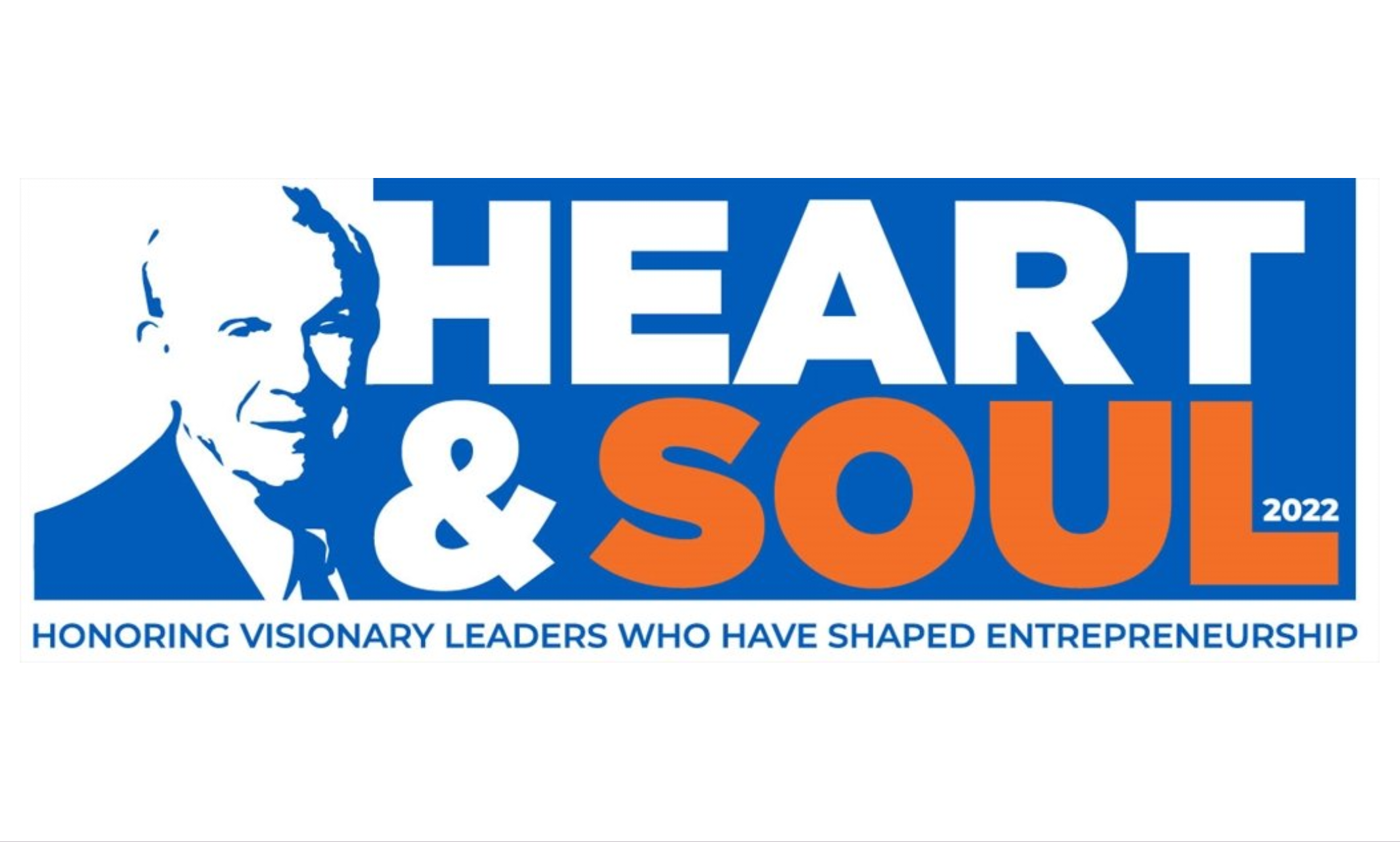
Six to receive Entrepreneur of the Year awards
Honorees for the annual Entrepreneur of the Year awards from the University of Missouri-Kansas City include the founder and chairman of the largest Black-owned company in the United States, and the person who launched wholesale automobile auctions into 21st century cyberspace.
The celebration is sponsored by the Regnier Institute for Entrepreneurship and Innovation at the university’s Henry W. Bloch School of Management.
The 2022 event will return to the traditional in-person format, and at a new location: Plexpod Westport Commons 300 E. 39th St., Kansas City. The event begins at 5 p.m. Oct. 12 with the Student Venture Showcase; the awards program begins at 7 p.m. Tickets may be purchased at this page.
The full list of 2022 honorees includes:
Henry W. Bloch International Entrepreneur of the Year Award: David Steward, founder and chairman of World Wide Technology. After being named the top sales executive for FedEx, Steward set out to fulfill a lifelong dream: own a company. He began WWT in 1990 with a handful of employees and a 4,000-square-foot office. WWT currently operates in 4 million square feet of space in more than 20 facilities throughout the world. The company employs more than 9,000 people globally and generates more than $14.5 billion in annual revenue. Steward is a civic leader and philanthropist committed to expanding opportunities for Black people and others from historically under-represented and underserved communities.
Kansas City Entrepreneur of the Year: Justin Davis, co-founder and CEO, BacklotCars.BacklotCars created a new model for wholesale automotive auctions, replacing scheduled events with a 24/7 online marketplace for dealers. BacklotCars, which launched in 2015, provides vehicle inspections, transportation and inventory finance services to dealers. The founders sold the company for $425 million five years after launch, with Davis staying on as CEO.
Marion and John Kreamer Award for Social Entrepreneurship: Bart Houlahan, Jay Coen Gilbert and Andrew Kassoy, co-founders of B The trio co-founded B Lab in 2006 to drive systemic change to address social and environmental problems. They created a corporate certification program that recognizes organizations maintaining high standards of social and environmental performance.
Student Entrepreneur of the Year: To Be Announced Each year the Bloch School’s Regnier Institute Advisory Council gives a $2500 scholarship to a Bloch School student for significant entrepreneurial achievement. The recipient will be announced at the event.
The Entrepreneur of the Year Awards event is an iconic Kansas City tradition started in 1985. Beyond its philanthropic cause, this event is a valuable forum where Kansas City CEOs, entrepreneurs, business owners, industry legends, world-class faculty and students alike are able to celebrate a common passion. The event celebrates entrepreneurial spirit and serves as a source of inspiration to future generations of innovative entrepreneurs.
All proceeds from this event directly benefit the Regnier Institute for Entrepreneurship and Innovation’s student and community programs. The Regnier Institute at the Bloch School focuses on connecting students and community members with a comprehensive combination of world-class research, renowned faculty, cutting-edge curriculum and experimental programs driven to deliver results and nurture the next generation of entrepreneurs.
Sep 16, 2022
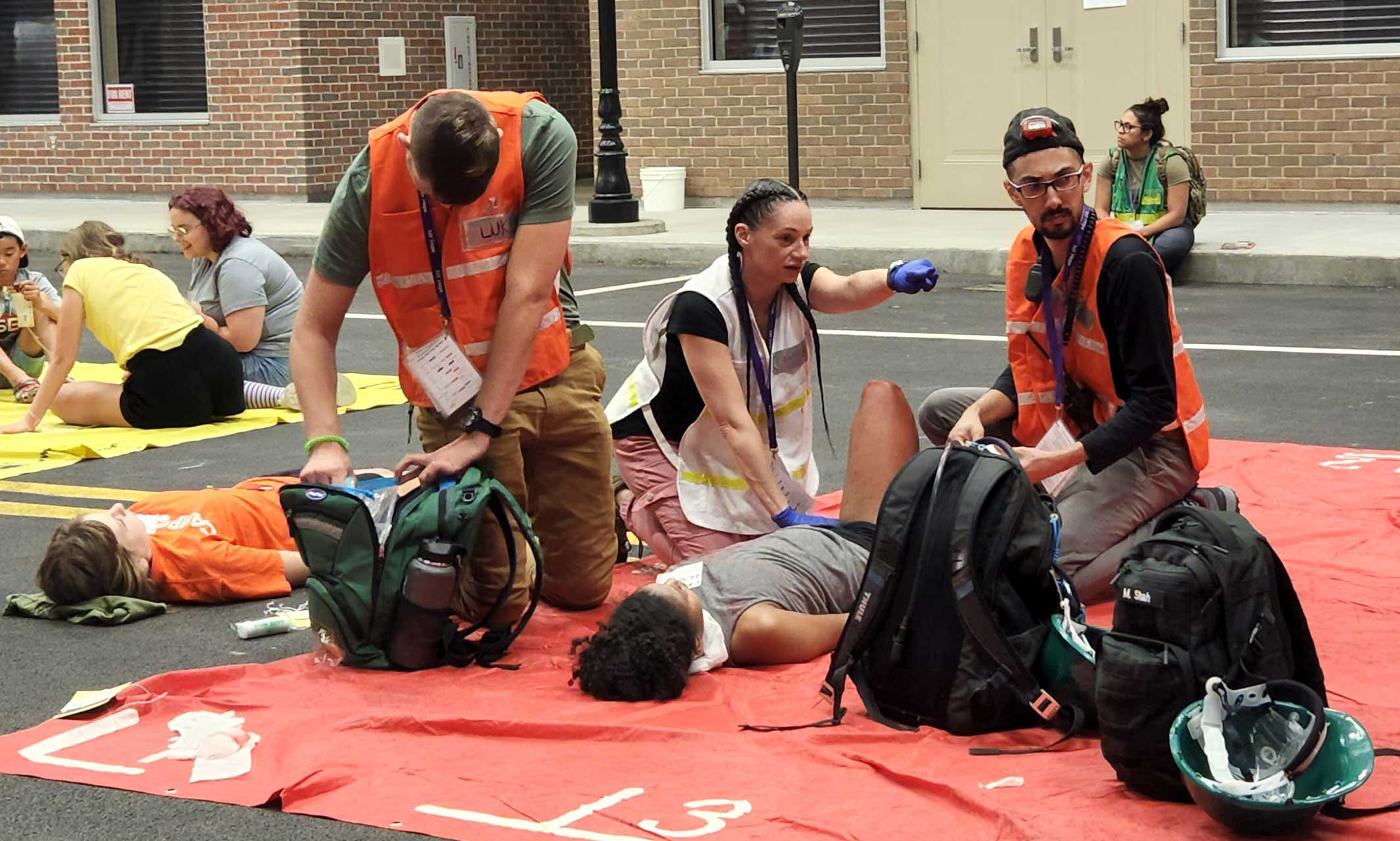
New York Hope challenged participants with earthquake aftermath simulation
Nursing student Faheem Rehman can add white water rescue to the skills he’s developed during his time at UMKC. Rehman was part of a group from the UMKC School of Nursing and Health Studies that participated in New York Hope, a national domestic disaster response exercise where participants hone their skills as emergency responders.
Held over four days at the Department of Homeland Security Training Facility in Oriskany, New York, the training partners college students in nursing, emergency management and homeland security with first responders for a simulated disaster similar to an earthquake. That included experience with swift water rescue, search and rescue in a demolished building and a mass casualty event in a shopping center.
Only three nursing schools were represented and of those just ten nursing students attended. In her role as assistant professor in the UMKC School of Nursing and Health Studies, Sharon White-Lewis has long been a champion of the Hope Exercises, which also include Missouri and Florida, where she has taken dozens of college students through the years.
In his second year as a nursing student, Rehman was excited for the opportunity to test his skills in such a unique environment.
“I’ve been in inpatient units where it’s a more controlled environment where you have a certain level of understanding of what’s going to occur,” Rehman said. “With the nature of a disaster or crisis, you don’t have that luxury.”
When he first arrived at the event, everything seemed foreign. There were four days without access to his phone or even a shower, sleeping on a cot next to people he’d never met. Once he settled in, Rehman was surprised how quickly he adjusted to this new normal.
"It really was incredible how quickly your mind adjusts to a setting like that,” Rehman said. “By the second day, it really did feel like my new home.”
That also meant teaming up with a group of complete strangers for the exercise. But Rehman said he and his teammates quickly developed an understanding of each other’s strengths and weaknesses and delegated accordingly.
“It felt like trauma bonding,” Rehman said. “By the end of our time together, I felt an inseparable bond with my team members. Even now we’re keeping in touch, texting each other.”
Rehman said the mass casualty exercise offered the most significant stress test on the nursing skills that he’s developed at UMKC. One of the more elaborate scenarios, which involves dozens of actors role-playing a wide range of injuries across a mock shopping mall.
“We set up a triage system where we prioritized people by walking wounded, delay care, immediate care and deceased,” Rehman said. “Doing all that quickly and efficiently really helped me hone my assessment skills.”
Triage wasn’t new for Rehman. White-Lewis took the students through a four-hour class before they departed for New York. In the training she covered the triage techniques unique to disaster response as well as other in-the-field medical treatments like spine mobilization and splints.
Rehman said he enjoyed the swift water rescue exercise most as it looked both “scary and fun.” The scenario put the participants in a pool with a fast-flowing current at a speed Rehman said he’d never experience before. According to White-Lewis, participants train in a level one current but the rapids can be pushed to a level four.
With his fellow participants, Rehman worked on both rescuing and being rescued. The local fire department taught them techniques for throwing ropes to someone in the current and skills to stay afloat while navigating a fast-moving current. White-Lewis said it’s a critical experience for the Kansas City area. “We’ve had a number of floods and emergency responders have had to rescue lots and lots of people.”
According to Rehman, the event left an indelible impression that has expanded his outlook on what nurses are capable of.
“It showed me that nursing isn’t limited to the walls of a hospital or a doctor’s office,” he said. “The preparation we were doing – readying ourselves for future disasters – this is for the greater good of society.”
White-Lewis will continue to provide students with this life altering opportunity when Missouri Hope will be held in the fall in Joplin, Missouri. She plans to bring 35 students with her. That scenario mirrors the aftermath of a tornado and she says it’s important experience for UMKC students. According to White-Lewis, after the devastating Joplin tornado in 2011, 135 nurses were deployed to the area to provide care.
“Students tell me these events change their lives,” she said. “They actually have to rely on themselves and they’re proud of themselves for utilizing their nursing skills. In nursing school it’s a lot of input, input, input, with all the studying. With this experience they get to output all of their knowledge.”
Sep 13, 2022

Leader will set priorities for establishing the new school
The dean of the School of Education, Social Work and Psychological Sciences will play a key leadership role in establishing the newly realigned school, with a focus on high-quality educational experience, impactful scholarship, a commitment to collaboration on university goals for student success, research growth, advancement of diversity and inclusion and active community engagement.
SESWPS combines education, psychological sciences and social work programs into a newly reimagined academic unit that will create new education and research synergies for students and faculty.
“The dean will set the tone, pace and priorities for the new school’s success,” said Jenny Lungren, provost and executive vice chancellor. “In addition, ideal candidates will have high impact engagement with community partners — with regional and state leaders in K-12 education, with social service and health care partners and with donors and civic leaders, among others.”
The person selected for this position will work closely with the provost, other senior leaders, faculty, staff and students to chart a bold and successful future for the School of Education, Social Work and Psychological Sciences.
The full roster of the search committee is listed below. Others will have the opportunity to provide input during the campus interview portion of the search process. The committee aims to conclude the search in early spring 2023, for a summer 2023 start date.
Full search committee
Michele D. Smith, vice provost for student affairs, dean of students and associate professor
Jennifer Waddell, Sprint Foundation Endowed Professor in Urban Education, associate professor, Division Co-Chair and Director
Louis Odom, professor, Teacher Education and Curriculum Studies
Tiffani Riggers Piehl, assistant professor, Educational Leadership, Policy and Foundations
Donna Davis, professor, Educational Leadership, Policy and Foundations
Ile Haggins, director of field education, advisor, field and practicum advisor, Social Work
Steven Onken, associate professor, chair of Social Work
Jake Marszalek, professor, Psychology; interim associate dean, SESWPS
Erin Hambrick, associate professor, Psychology
Shewit Abai, student
Michael Pragman, director, Kansas City Regional Professional Development Center
Irene Caudillo, president and CEO, El Centro
Brandon Martin, vice chancellor and athletics director, executive in residence in SESWPS
Sep 09, 2022
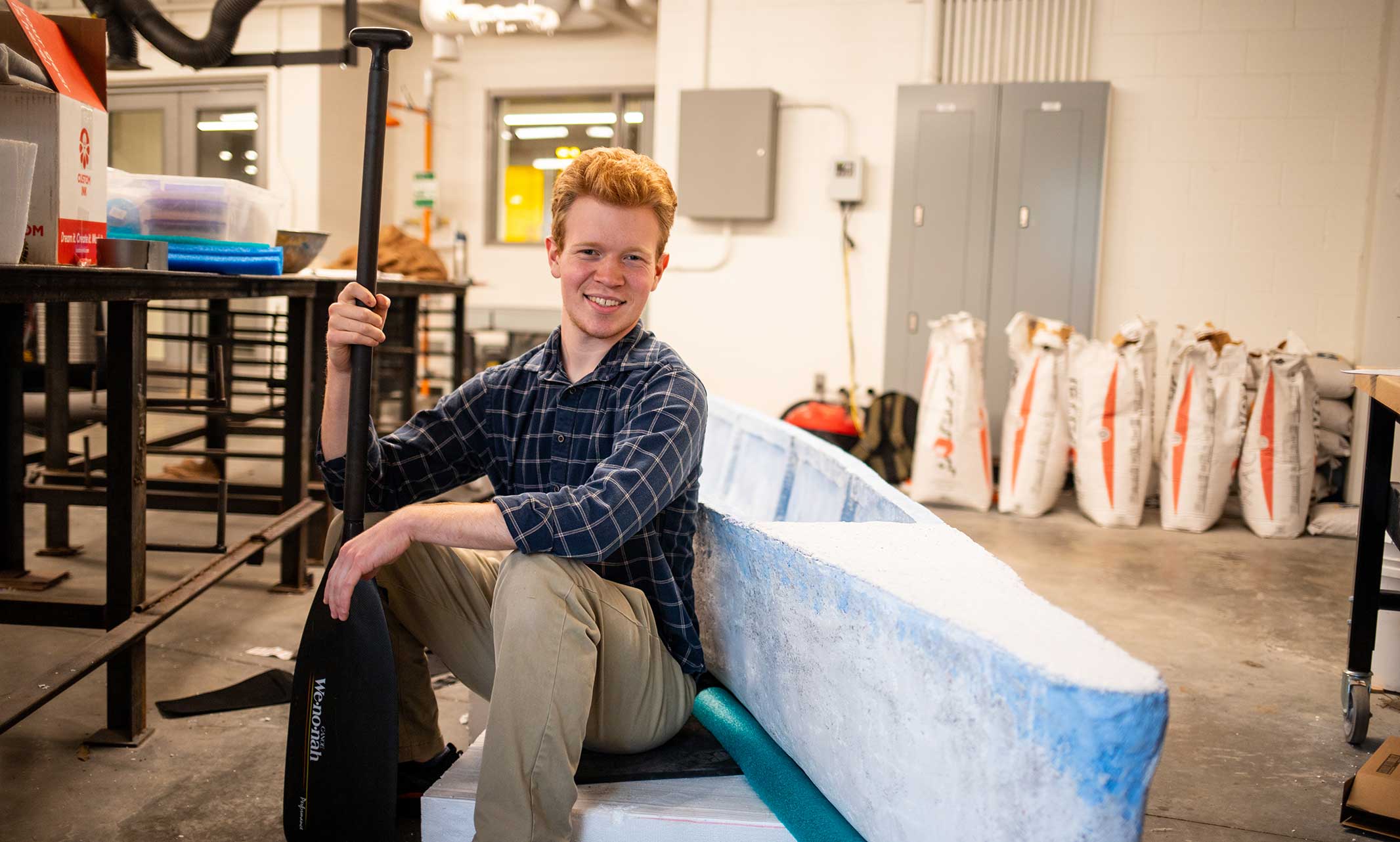
Concrete Canoe competitor finds value in work-life balance
Roos don’t just dream, they do. Our students turn ideas into action every day. Get to know our people, and you’ll know what UMKC is all about.
Sean PurdueAnticipated Graduation Year: December 2023UMKC degree program: Civil Engineering, minor in historyHometown: Liberty, Missouri
Looking to study civil engineering close to home, Sean Purdue chose UMKC for a balance of academic and student life opportunities. He’s a student ambassador of the Honors Program, the president of the UMKC chapter of the American Society of Civil Engineers and competes on the school’s Concrete Canoe team.
Why did you choose your field of study?
I chose civil engineering because it is a very broad field, and it gives me a lot of options for when I decide what I want to do as a career. My grandfather was a civil engineer, so that also inspired me. The history minor is just because I love history.
How has your college program inspired you?
I’ve definitely been inspired by learning about how much the world revolves around civil engineering. Water, transportation, buildings, we play a part in everything. It’s also amazing how much good engineering can improve the world.
Who do you admire most at UMKC and why?
My friend Brett Keegan, who is also a civil engineering student. He commutes to campus from St. Joseph (about an hour one way) and has a young child, but he still finds time to help out with Concrete Canoe and to just be a great friend. I probably could not do what he does, and I find it very admirable.
Since entering college, what have you learned about yourself?
I’ve learned that I want a life that is centered on family and activities that interest me outside of work. Still trying to figure out how to balance everything. I’ve also learned a ton about my leadership style and how I react to stress.
What do you hope to take from your experiences at UMKC into your professional career?
Knowledge on how to manage teams and people. Also that information about my own nature (see the previous question) will be pretty important to not burn out. I also want to always remember those that helped me throughout my college career and try my best to be similarly helpful wherever I go.
What are you most proud of during your time at UMKC?
Making a concrete canoe is certainly up there. It’s not the prettiest or the lightest or the strongest, but it is a canoe and it is made of concrete. I am also happy that I know a lot of the people in my classes. I think it’s very easy to just go to class and leave without making connections, but I’m proud of the connections I’ve made.
Sep 08, 2022
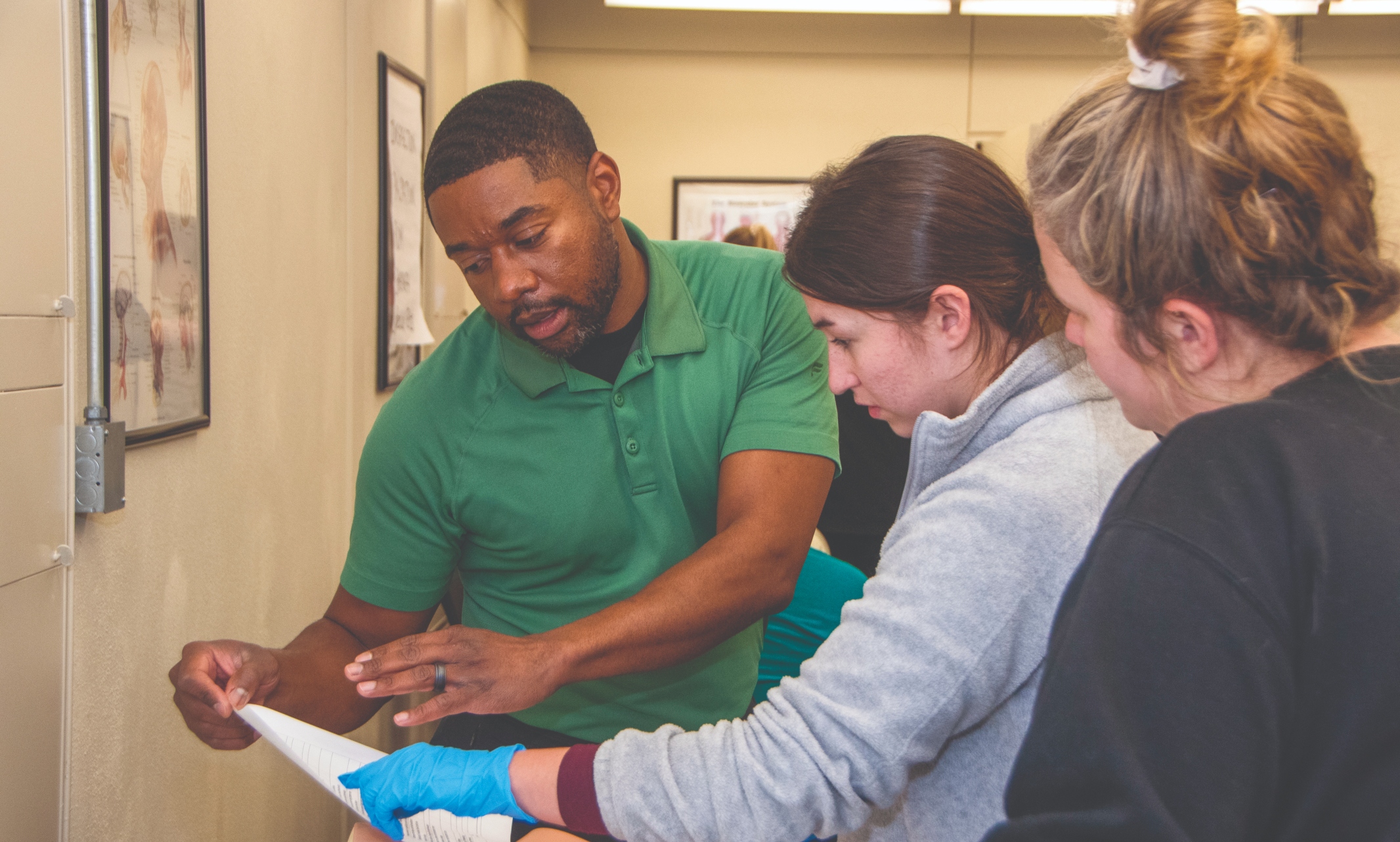
Major David Walker joins the School of Medicine faculty, bringing his Army experience to UMKC's Physician Assistant program.
Major David Walker has been added as a new faculty member to the Physician Assistant (PA) program at the UMKC School of Medicine. Walker’s path to UMKC was a bit unique.
Initially, Walker came to the department for an internship through the Army Career Skills Program, which sponsored his time at UMKC. The Army initiative helps veterans transition to civilian careers. During the internship, Walker worked closely with the PA faculty on day-to-day delivery of the curriculum, while he was involved in all aspects in the classroom, including skills instruction and assessment.
Julie Banderas, assistant dean, Graduate Health and Professions, said it’s the first time the Physician Assistant program has worked with the Army Skills Program. “We saw this as an excellent opportunity with mutual benefits,” she said.
Walker said he experienced many teaching opportunities in the military. “As you move up the ranks in the military, you’re always looking behind you to train your subordinates and bring them up as well,” he said. “Those opportunities gave me a great deal of experience with the student-teacher and mentor-mentee dynamic.” According to Walker, there was much to like about UMKC and its PA program. “I was drawn to the mission at UMKC– how involved they are with the community,” he said. “The program’s emphasis on diversity, equity and inclusion was important as well, and their focus on recruiting students with diverse backgrounds.”
Walker enlisted straight out of high school, two weeks after graduation, to be exact. “With my birthday in July,” he said, “I wasn’t even 18 yet at the start of basic training.”
He originally served as a military intelligence technician. According to Walker, the job sounds like a big deal, but he adds, “I was basically an IT guy.” An “IT guy” with top security clearance, nonetheless. He worked the first couple of years for the National Security Agency, deployed in Iraq. That’s where he met his wife, and after their son was born, he began looking at his future after the military.
He landed on the physician assistant program through the military, an inter-service PA program accredited through the University of Nebraska. Through the program, he not only received his bachelor’s degree, but a master’s degree and then a commissioning to officer as a first lieutenant.
“I wasn’t even 18 yet at the start of basic training.” — David Walker
Walker was drawn to the problem-solving aspect of a career as a physician assistant. “I like putting puzzles together,” he said. “My patient is telling me their symptoms; I’m performing the physical exam. I’m finding the pieces to put together to figure out a diagnosis and develop a treatment plan with them.”
According to Eric Johnson, program director for the PA program, Walker is a great addition to the team.“Major Walker’s military experience, while significant, is not the only contribution he brings to the PA program,” Johnson said. “He brings racial and gender diversity to the program faculty, as well as a role model to all our students, but especially to those whose background and experience may be similar. Often overlooked is David’s correctional medicine experience, which presents unique complexities that few clinicians encounter.”
The UMKC Master of Medical Science Physician Assistant Program is a seven-semester program based in the UMKC School of Medicine and has been accredited since 2014, with more than 100 alumni PAs. Walker joins a faculty team of three other full-time PA faculty members and nearly 60 current students.
Sep 08, 2022
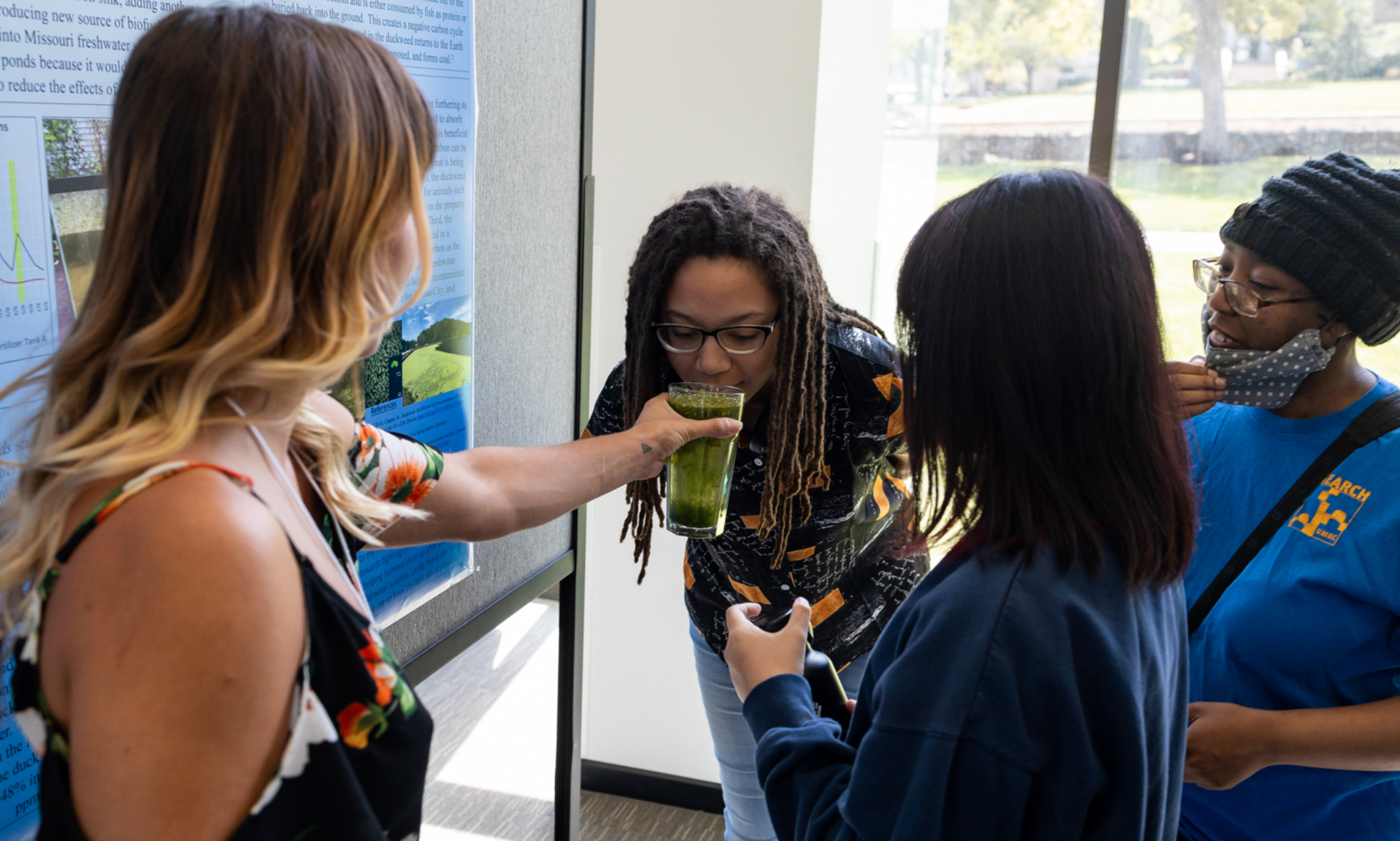
Undergraduate research symposium demonstrates students making the most of opportunities to excel
Amanda Pierce had already launched her professional career at EcoSafe Environmental Services in the Crossroads District after finishing her degree requirements at the end of July. So, what was she doing back on campus in August, standing in front of a poster in Miller Nichols Library and Learning Center?
Living her passion.
The poster described her research into duckweed, an innocuous-looking but environmentally powerful plant. She earned her final credits for her degree in earth and environmental science researching the ability of duckweed to do double duty sequestering carbon dioxide while removing contaminants in waterways. She had the credits, the degree and the professional career, but she came back to present and discuss her findings at the annual UMKC SUROP Poster Symposium.
“I’m very passionate about my research,” she explained. “At first, I wasn’t really even doing (the research) for school. I put my time and energy into it, and I was proud of it, and I wanted to share this cool information with people.”
That’s the secret of SUROP (Summer Undergraduate Research Opportunity), one of several UMKC programs that encourage undergrads to dive deep into their studies by funding research expenses for approved projects. The programs create a bridge linking passion to tangible performance.
SUROP grants provide students with a $2,000 tuition grant and up to $1,250 in reimbursable research expenses for projects undertaken during the summer. The SUROP Poster Symposium celebrates the work that undergraduate researchers, scholars and artists and their faculty mentors have accomplished during the summer months.
Information about undergraduate research opportunities, funding and application deadlines is available at the Undergraduate Research and Creative Scholarship page.
Pierce was one of 19 students who received funding for summer research projects this year, on topics ranging from the urban heat island effect in Kansas City, to health policies related to child obesity, to using 3-D printing to create structures that mimic living tissue.
Another was Laura Munoz-Baroja, who also competes as a scholarship athlete on the UMKC women’s tennis team. She tested techniques for improving the efficiency and performance of solar energy panels.
Current panels convert only about 20 percent of the solar radiation they receive into electricity, and the rest gets converted into heat, which limits the performance of the panel. Munoz-Baroja investigated coatings that can convert more of the light entering the panel into wavelengths that produce electricity instead of heat. By using external coatings, the enhancement can be applied to existing panels without expensive and time-consuming internal design changes. She tested coating materials that are durable enough to last as long as the panels, even under exposed outdoor conditions.
Sam Sisk also focused his research on keeping things cool, but his medium was semiconductor computer chips. At temperatures above 80 degrees C., the speed and accuracy of chips declines significantly, so cooling has always been a key element of the design of computerized equipment. Cooling systems integrated into chips is the modern solution, but those systems create less than ideal interaction between the chip and the coolant. Sam’s solution: go small. He designed a miniaturized system for injecting liquid coolant directly onto the surface of individual chips, generating more direct contact with the coolant while requiring minimal energy to pump the liquid.
2022 SUROP Presenters
Shuyuan Tian, Chemistry
Chirality-Driven Self-Assembly: In Situ Preparation of Structurally Distinct Janus
Dendrimers
Faculty Mentor: Shin Moteki
Kate Larberg, Earth and Environmental Science
Making the Kansas City Urban Heat Island Effect Approachable
Faculty Mentor: Fengpeng Sun
Kaitie Butler, Mechanical Engineering, Honors Program
Fabrication of Color-Changing Materials Using Liquid-in-Liquid 3D Printing Methods
Faculty Mentor: Zahra Niroobakhsh
Laura Munoz-Baroja, Energy, Matter and Systems
Performance Enhancement of PV/T Systems Integrated with Nanofluids
Faculty Mentor: Sarvenaz Sobhansarbandi
Christian Dang, Biology, Honors Program
A Self-Directed Mutagenesis Approach for Examining the Drosophila Tribbles
Recognition Degron in the C/EBP Transcription Factor Slbo
Faculty Mentor: Leonard Dobens
Jay Vanderslice, Physics
Creating Continuous and Universal Paths for Crystal Structures
Faculty Mentor: Paul Rulis
Charlotte Rooney, Earth and Environmental Science
Assessment of Urban Prairie and Phytoremediation Plants as a Means to Regenerate
Urban Soil
Faculty Mentor: Caroline Davies
Amanda Pierce, Earth and Environmental Science
Decontamination and Carbon Sequestration of Missouri Freshwater by Duckweed
Faculty Mentor: Alison Graettinger
MaAh Kyi, English/History
The Missouri Bicentennial Project: Recent Immigration
Faculty Mentor: Diane Mutti Burke
Judy Vun, Nursing
A Secondary Data Analysis of the Child Obesity and Health Messaging Preferences
among Missouri Policymakers (CHAMP) Study
Faculty Mentor: Anita Skarbe
Sam Sisk, Mechanical Engineering
In-Chip Cooling Technology within Semiconductor Switches
Faculty Mentor: Sarvenaz Sobhansarbandi
Saivagmita Kantheti, Six-Year BA/MD
A Text Mining Approach to Determine Correlations between the Spanish Flu and
COVID-19
Faculty Mentor: Billie Anderson, Ph.D.
Britton Needham, Biology/Chemistry
Probing Biological Redox Chemistry with Microelectrodes
Faculty Mentor: Mohammad Rafiee
Drew Nelson, Mechanical Engineering
Small Rifle Primer Characterization
Faculty Mentor: Travis Fields
India Fernandez, Biology
Creation and Repair of Educational Anatomy Models
Mentor: Rachael Allen
Michael Englert, Mechanical Engineering
Development of a Highly Thermal Conductive Nanofluid for the Application in Solar
Thermal Technologies
Faculty Mentor: Sarvenaz Sobhansarbandi
Hannah Briggs, Biology
Chirality-Driven Self-Assembly: Application toward Renewable/Exchangeable
Resin-Immobilized Catalysts
Faculty Mentor: Shin Moteki
Luke Romang, Earth and Environmental Science
Depositional Setting, Provenance, and Tectonic Implications of the Carmen Formation
on San Marcos Island, Baja California Sur, México
Faculty Mentor: Tina Niemi
Austin Cass, Mechanical Engineering, Honors Program
Creating Soft, Gel-Like Tubes for Biomimicking Tubular Tissues Using Liquid-in-Liquid
3D Printing
Faculty Mentor: Zahra Niroobakhsh
Sep 08, 2022
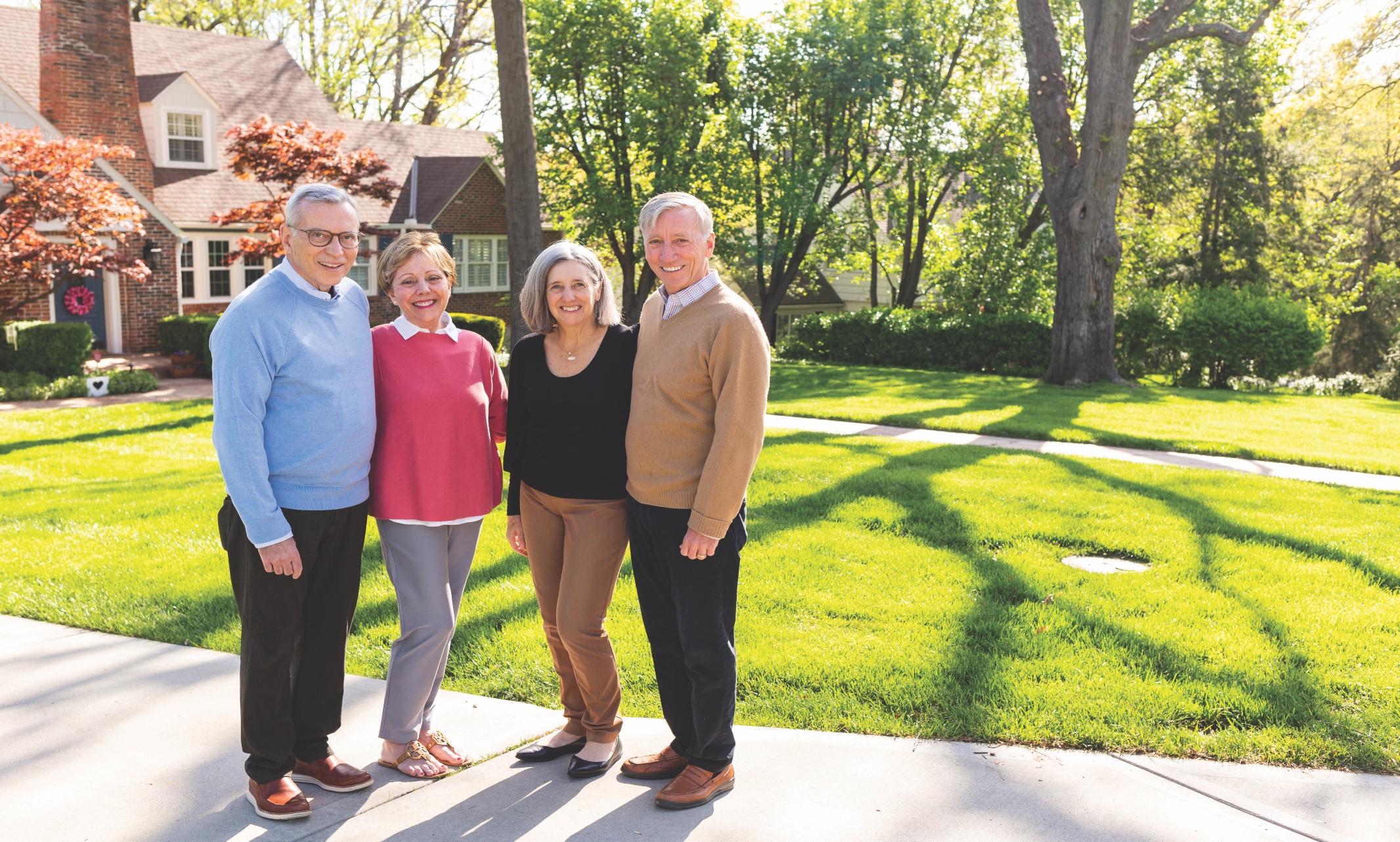
Alumni share their experience as couples in the School of Medicine
The bonds built within the UMKC School of Medicine community are strong and long-lasting. Friendships are forged, but often families, too, take shape. Spanning 40-plus years, these alumni couples are a testament to that connection. Some are just beginning their lives together, and some have celebrated several milestone anniversaries.
Teammates and soulmates
Blake and Katy (Nichols) Montgomery’s relationship, and their medical careers, have taken them all over the country. But first, it was basketball that brought the 2015 and 2016 M.D. graduates together. They met their first year of medical school while playing on a three-on-three team, and they stayed teammates throughout their time at UMKC. “The best part of finding your spouse in med school is you have a nonstop cheerleader,” Katy said. “You’re rooting for each other every step of the way, and it’s a shared gratification when the other succeeds.”
Although they started at UMKC at the same time, Blake was accepted to the Medical Research Scholars program at the National Institutes of Health in 2013. That meant Katy would end up graduating a year ahead of him.
In 2015, the same year the couple tied the knot, Katy matched in pediatrics at Children’s Mercy. Soon after, Blake matched at Stanford University in orthopedic surgery and moved to Palo Alto, California, while Katy stayed in Kansas City.
“Both of us being in medicine, I feel like we have a complete understanding of the other person’s life,” Blake said, “and that’s made our relationship that much stronger.”
Katy was able to transfer her pediatric residency to Children’s Hospital Los Angeles to finish up her final two years. Although the couple was still separated by a six-hour drive, they took advantage of their more frequent reunions.
“Having limited time together made us cherish every moment,” Katy said.
The couple is now together in Boston, where Blake began his first pediatric orthopedic fellowship and where their family grew to three. They welcomed a baby girl in January 2022.
“You’re rooting for each other every step of the way, and it’s a shared gratification when the other succeeds.” —Katy Montgomery
The couple’s next adventure will take them to Auckland, New Zealand, where Blake will start a fellowship specializing in pediatric orthopedic spine surgery. Katy plans to pursue an international certification in lactation.
The time they have spent apart has made the couple grateful for the everyday things many take for granted.
“It sounds cheesy, but once we finally moved in together, all the little things seemed so much better,” Katy said. “Like, wow, we get to go to the grocery store … together.”
“When we were apart it felt like something was always missing, like half your heart is across the country,” Blake said. “Now that we’re back together, you just feel complete.”
From high school to med school
Chizitam and Ginika Ibezim’s connection started even before they were medical students. The 2020 and 2021 M.D. graduates met in 2013 in the UMKC Summer Scholars Program (now the STAHR program) for high schoolers exploring medical careers. Chizitam was a senior from Austin, Texas, and Ginika a junior from Chicago.
The two were in an anatomy class together when Ginika tried to strike up a conversation with Chizitam. But he was all business.
“I had tunnel vision, thinking, ‘If I can do well in Summer Scholars, I can get in the program,’” Chizitam said.
It would take two years for Ginika and Chizitam to cross paths again. And Chizitam wasn’t going to miss out this time. He was helping at a student organization event when he recognized Ginika in the crowd.
“I remember coming up with a bunch of excuses for us to meet up,” said Chizitam. “I was selling my first-year text books and I offered to just give them to her.”
The two exchanged text messages nonstop that summer and soon were a power couple, frequently commandeering a table at Starbucks, studying for several hours of the day.
“We were learning the same things and going through the same experiences,” said Chizitam. “It made that aspect of med school kind of fun.”
The couple got engaged in the Summer of 2019 and tied the knot in April 2020 with a small ceremony in Chizitam’s hometown of Austin. But Ginika still had another year of medical school before the couple could finalize their future together.
“We couldn’t do the couple’s match because we weren’t in the same class,” Ginika said. “We just had to hope and pray that we matched together.”
Ginika’s residency search took her nearly everywhere in Texas: 26 interviews in total. She narrowed her list to three family medicine residencies, and ended up matching in Austin at the same hospital as Chizitam.
“I was selling my first-year text books and I offered to just give them to her.” —Chizitam Ibezim
The couple’s conversations used to focus on work, especially since they were in the same hospital and program, but that’s changed with the addition of their now 4-month-old daughter.
“We’ve transitioned to talking about our aspirations outside of medicine, and that’s been really refreshing,” said Chizitam. “We’re talking about where we want to travel and things we want to see.”
‘Really good waltz partners’
School of Medicine founder E. Grey Dimond, M.D., left quite an impression on Stan and Kathleen Shaffer, 1979 M.D. graduates, when he spoke to their medical school class in the summer of 1973.
“He gave us a stern talk where he told us we wouldn’t have time for dating,” Stan said. “Unless we look around the room and find someone as serious as us about being a physician.”
Stan and Kathleen knew each other in passing, until their second year in the program, when they were in a social dance class together. Although they rotated dance partners, Stan and Kathleen figured out early on where they clicked.
“It turned out we were really good waltz partners,” Stan said. “And we have said: It’s really wonderful to marry your waltz partner.”
Any medical student knows the residency match is a huge step in becoming a doctor. But it was even bigger for the Shaffers. On top of navigating the next stage of their careers, they were also considering the next stage of their relationship: marriage. To match as a pair, they had to be married. Dating or engaged wouldn’t cut it. So, in February 1979, the Shaffers wed, and a few months later they matched together at Children’s Mercy Hospital in Kansas City.
“Going into medical school, I didn’t have dreams of weddings or anything,” Kathleen said. “At that time, women in medicine weren’t thought to have time to get married. So, I thought becoming a doctor and getting married was a double win for me.”
Kathleen has stayed in pediatric medicine for 36 years in Kansas City. Stan moved into neonatal medicine, where he established the intensive care nursery at Saint Luke’s Hospital. In 2014, he transitioned his focus to global health.
His interest in global health and Kathleen’s expertise in pediatrics have taken center stage in their work providing health care in Haiti for more than 35 years. Their two children even joined them on mission trips, a tradition that has continued into their adulthood.
"It’s really wonderful to marry your waltz partner.” —Stan Shaffer
According to Stan, the trips to Haiti also consumed a great deal of their discussions. Those talks – as well as the trips themselves – instilled in their children the incredible scope of what health care can provide to those in need.
“We weren’t talking about insurance plans or paperwork,” said Kathleen. “It was about larger medical issues and the philosophy of medicine.”
The groundwork they laid helped inspire both children to follow in their parents’ footsteps. Their daughter, Brynn, graduated from the University of Kansas School of Medicine in 2010, and their son, Christopher, graduated from the UMKC School of Medicine in 2006.
The family the Shaffers built together may certainly last a lifetime, but the friendships they’ve built have lasted almost as long. A couple they became close friends with at UMKC — current School of Medicine Dean Mary Anne Jackson (M.D. ’78) and her husband, Jay Jackson (M.D. ’78) – were the Shaffers’ neighbors for more than three decades.
Working and learning together
According to Jay, he and Mary Anne had finally given up on their house hunt when the Shaffers told them the house next door in their Kansas City suburb was going on the market.
“They found our house for us,” said Jay. “We’ve been there probably 34 years, so we’re obviously thrilled to have been their neighbors.”
Just as the Shaffers received relationship advice from Dimond that first summer, Jay said he and Mary Anne heard the same message. In 1978, during their fifth year of medical school, the Jacksons got married so they could also match together.
The Jacksons coupled up early on in their time at UMKC. Jay recalled many days and nights studying together. He was the expert on humanities, and Mary Anne, ever the educator, helped him with some of his sciences.
“I struggled with chemistry in particular,” said Jay, “but she made it light up for me.”
All those study sessions paid off. Mary Anne has a successful career in infectious diseases and medical education and Jay is a recently-retired cardiologist.
The hours Mary Anne and Jay put into their careers have been long, but the choice to become doctors was an easy decision for both of them.
“Medicine is what we were called to do,” Jay said.
With the 50th anniversary celebrations continuing, many alumni are reminiscing about their time at UMKC and all it has given them, including the Jacksons.
“I look back on our time at UMKC, and as hard as we worked, they were really fun times,” Jay said. “Mary Anne asked me what my best memory was from that time. I told her, ‘Well that’s easy. The best thing that happened to me in med school was meeting you.’”
Sep 08, 2022
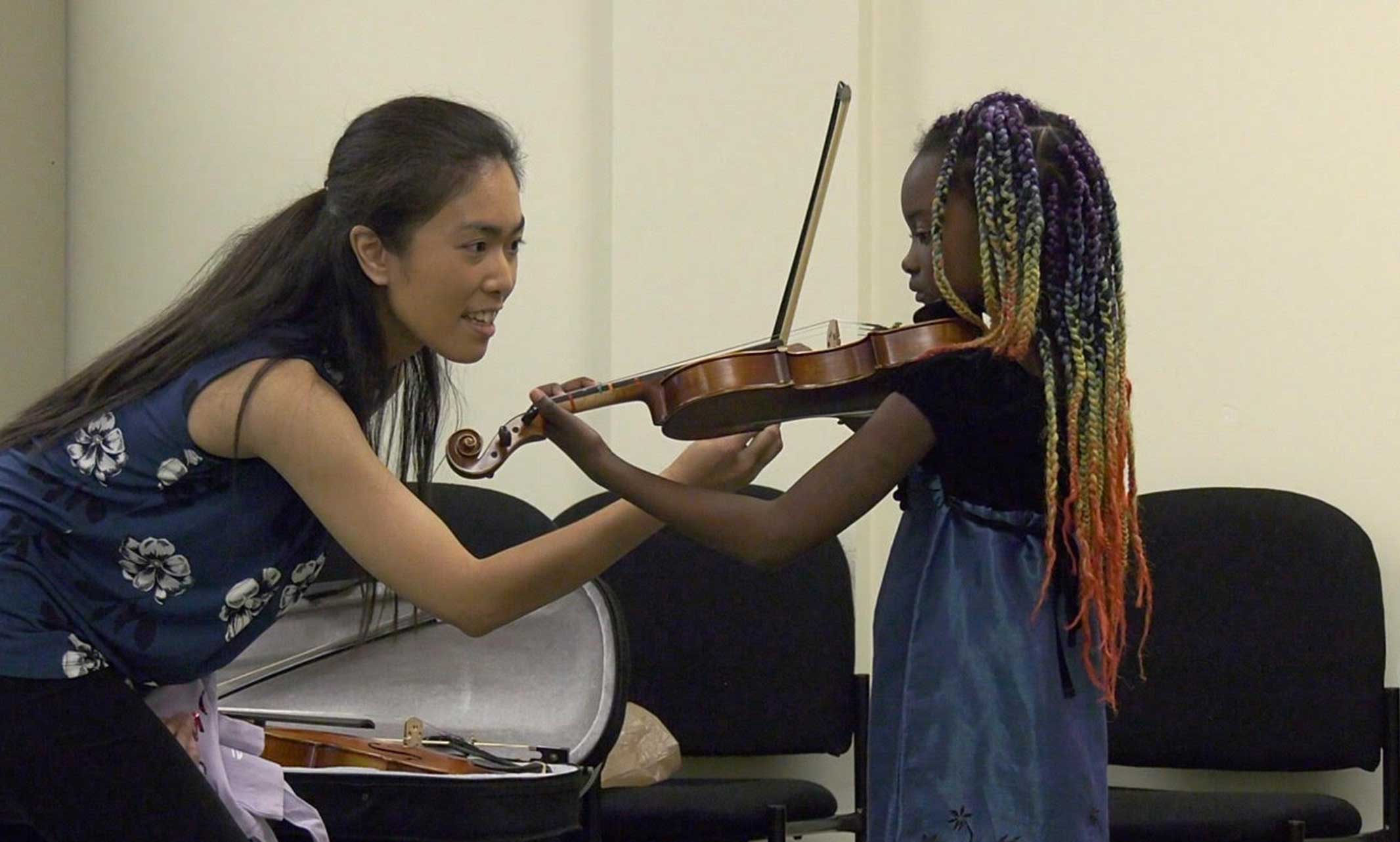
Doctoral student En-Ting Hsu is helping Kansas City children embrace her art
Roos don’t just dream, they do. Our students turn ideas into action every day. Get to know our people, and you’ll know what UMKC is all about.
En-Ting HsuAnticipated graduation year: May 2023UMKC degree program: DMA in viola performanceHometown: Tainan City, Taiwan
En-Ting Hsu discovered at a young age the power of exposure to music and the way it can change a life.
It happened for her as a child in Taiwan. Now she is making it happen for children in Kansas City.
Her parents, both music lovers, took her to sit in the audience for a Master Class being conducted there by Scott Lee, now associate professor of viola at the UMKC Conservatory.
The 12-year-old En-Ting was awestruck – and launched onto a musical career that led her to pursue an undergraduate music degree at National Taiwan Normal University, then a Master of Music from Indiana University Bloomington.
When it came time to choose a doctoral program, “I Googled to see where (Lee) teaches.”
Once she enrolled at UMKC, Lee introduced her to his brother, Jackie Lee, a UMKC alumnus and artistic director of Heartland Chamber Music. She participated in the organization’s summer music festivals. Five years ago, when Heartland launched its String Sprouts program, a free music education program designed for underserved children ages 3 - 8, Hsu was hired as the lead violin teacher.
Bev Chapman, a former local television news reporter, has spent the past five years tracking the progress of the youngsters under Hsu’s tutelage for a recently completed documentary film.
Sep 07, 2022
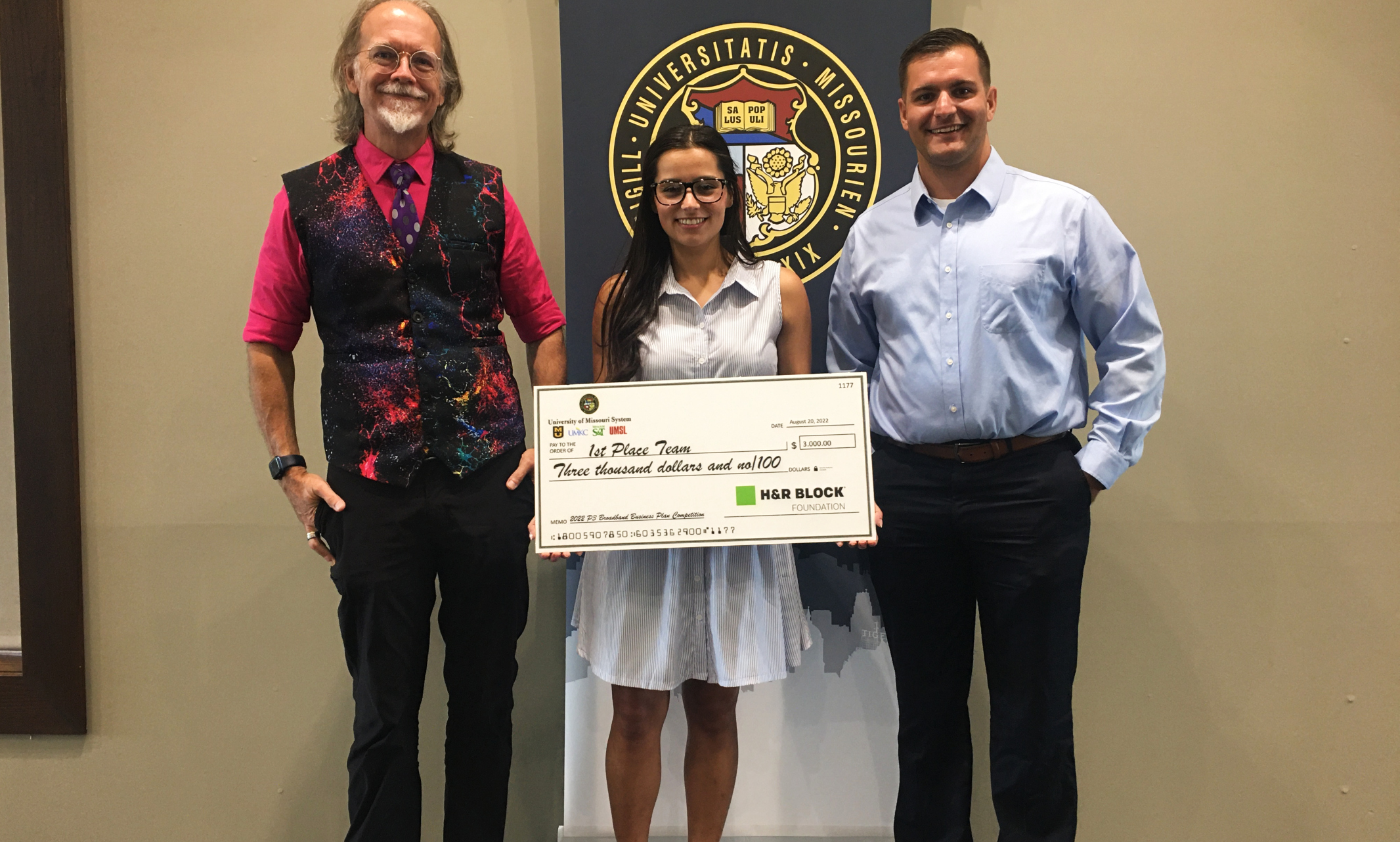
UMKC students win System-wide competition to design a possible public-private partnership internet utility
A team of University of Missouri-Kansas City students took first place in a UM System competition to design a public-private partnership plan to extend broadband internet service to a five-county region in northwestern Missouri.
The competition was open to students at all four UM System universities. The competing teams combined undergraduate and graduate students from an array of majors and disciplines, including Law, Computer Science, Business and Engineering. The students used surveys, research, data and information from local stakeholders to develop proposals to use private-public partnership business models to create affordable, feasible and economically sustainable plans to bring broadband service to Atchison, Gentry, Holt, Nodaway and Worth counties in Missouri.
The team of Daniel Foose, UMKC Law; Sofia Hadley, UMKC Law; and John Welch, UMKC School of Science and Engineering won the top prize of $3,000 for a plan that suggested consideration of a fiber optic system built on top of existing power utility infrastructure, along with other components regarding broadband infrastructure, access and adoption and potential sources of funding.
Foose, who earned his undergraduate degree from Northwest Missouri State University, was intrigued by the idea of bringing broadband coverage to the underserved northwest counties.
“I sort of saw it as a way to give a little bit back to a community that had done so much to help shape me into who I am today,” he said.
The H&R Block Foundation donated a total of $5,000 in prize money for the competition.
The second-place team included:
Ankit Agarwal, Missouri University of Science and Technology Engineering Management
Alasia Buschkopf, University of Missouri-St. Louis, Computer Science
Clifton Holly, UMKC Law
Tara Ogoti, UMKC Science and Engineering
Third place:
Chandrashekar Akkenapally, S&T Computer Science
Anna Heetmann, UMKC Law
Emilie Moyer, UMKC Bloch School of Management
Tarun Sai Naregudam, S&T Computer Science
Oluwatosin Waleola, S&T Information Science and Technology.
The presentation event in the competition took place Aug. 20 in Maryville.
The competition was initiated by Anthony Luppino, Rubey M. Hulen Professor of Law and Director of Entrepreneurship Programs at the UMKC School of Law, and a member of the UM System Broadband Initiative Steering Committee. That steering committee evolved from a 2019 proposal for a UM System-wide broadband initiative put together by Luppino; Marcus McCarty, UMKC adjunct law faculty; and Casey Canfield, an engineering professor at S&T. The proposal was adopted at the System level and refined, further developed and implemented by faculty and staff from all four System universities, KCSourceLink, MU Extension and UM System Engagement and Outreach.
The student competition was the latest addition to the UM System Broadband Initiative, which also includes the Digitally Connected Community Guide.
“It occurred to me that the concept of the Regnier Venture Creation Challenge (an entrepreneurship competition run by the Bloch School) could be applied to broadband access challenges,”Luppino said. “Instead of independent ventures, the student teams would be developing concepts for public-private partnerships.”
He called the competition a great example of “the power of multidisciplinary and inter-institutional collaborations,” with contributing organizations providing an opportunity for students to “demonstrate their knowledge, talents, and teamwork in a service-learning experience focused on a critically important subject.”
Sep 06, 2022
